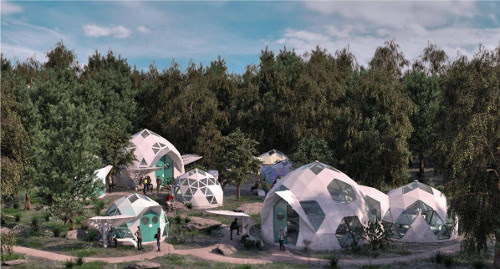A couple of years ago, I stumbled upon a company called Geoship.
Geoship is a company that’s building what it calls, the home of the future. But it’s not an ego project.
In other words, Geoship isn’t trying to build something super fancy and expensive for the wealthy and eccentric. Instead, Geoship is building a new type of home that is simply better suited for the 21st century, where it’s becoming harder and harder for the average person to afford a home that is not only safe and sturdy, but one that has been designed to adapt to climate change.
We know that in a post-carbon world, our homes must be better equipped to deal with everything from heat waves to megadroughts to extreme flooding. And these homes cannot be cost-prohibitive to build, either.
So this is what Geoship is looking to deliver …
An affordable home for the masses that is designed specifically to withstand the effects of climate change.
The Shape of Home Construction to Come
Geoship has designed a home that incorporates geodesic geometry with super strong bioceramic composites.
To clarify, geodesic geometry is the framework under which geodesic domes are built. Geodesic domes are the lightest, strongest, and most efficient structures known to man.
And bioceramic composites are incredibly strong. So strong, in fact, they can rival the flexural strength of steel. They actually cure in minutes at room temperature and bond to natural fibers. Bioceramics essentially mimic the chemical bonding that nature uses to form bone and seashells.
There are dozens of advantages to these particular geodesic domes, which include, but are not limited to …
- A 90% reduction in CO2
- 10 times more energy efficient than conventional homes
- Near zero waste in the construction process
- 500-year design life
- Resilient to fires, floods, hurricanes, earthquakes and insect infestations
- Can be manufactured in 3 minutes
- The materials cannot rot, burn, or rust
Now what makes Geoship particularly interesting, from an investment perspective, is not just its ability to meet a growing demand for safe, affordable housing, but also its margins.
Geoship can sell one of its smaller geodesic homes for $110,000, with cost of goods coming in at around $24k.
The company is beginning its operations in California, where the median price of a house in 2022 was around $834,400, or about 10x the annual household income.
The initial price estimate for a 1,675 sq. ft. Geoship home in California is $380,000. That’s more than 50% cheaper than a conventional home.
And because of its design, it’s also cheaper to heat and cool.
This is not inconsequential, as the average California homeowner spends around $2,000 a year on energy bills. The estimated energy bill for one year in a geoship? About $450.
Again, NOT inconsequential.
Of course, the aesthetics may be a little jarring for some. But I actually love how these things look …

And given the pricing advantage on these structures, along with the durability of the domes and the highly competitive costs to heat and cool them, Geoship could be onto something here.
I almost see Geoship like Tesla.
When Tesla first came out, it was like pulling teeth to get folks to realize that electric cars were actually superior to internal combustion in so many ways. But it was new. The whole concept of an electric car was foreign to so many drivers.
When Tesla first went public, the amount of electric cars on the roads amounted to little more than an accounting error. Today, there are nearly 17 million electric cars on the roads. They’re everywhere. And the rapid growth of the electric vehicle market is not going to slow down anytime soon.
This is because Tesla proved to the world that there is a very real demand for electric cars.
And there’s also a very real demand for safe and affordable housing.
Geoship may have simply figured out a way to design a stronger, more energy efficient home at half the cost of a traditional home. And if the company can prove its concept successfully, I see no reason why it can’t prove to be one of the most disruptive forces the home construction industry has seen in a hundred years.
Quite frankly, I love the concept, and would not be opposed to buying one of these homes once they hit the market. And I’ll likely invest a few bucks in the company, too, as it’s now doing a small $4.4 million equity crowdfunding raise.
The minimum investment is only around $400, anyway. Not bad for a company that already has a 40 million customer pipeline valued at $2.4 billion.
You can learn more about Geoship, and how you can invest in it here: https://republic.com/geoship?

